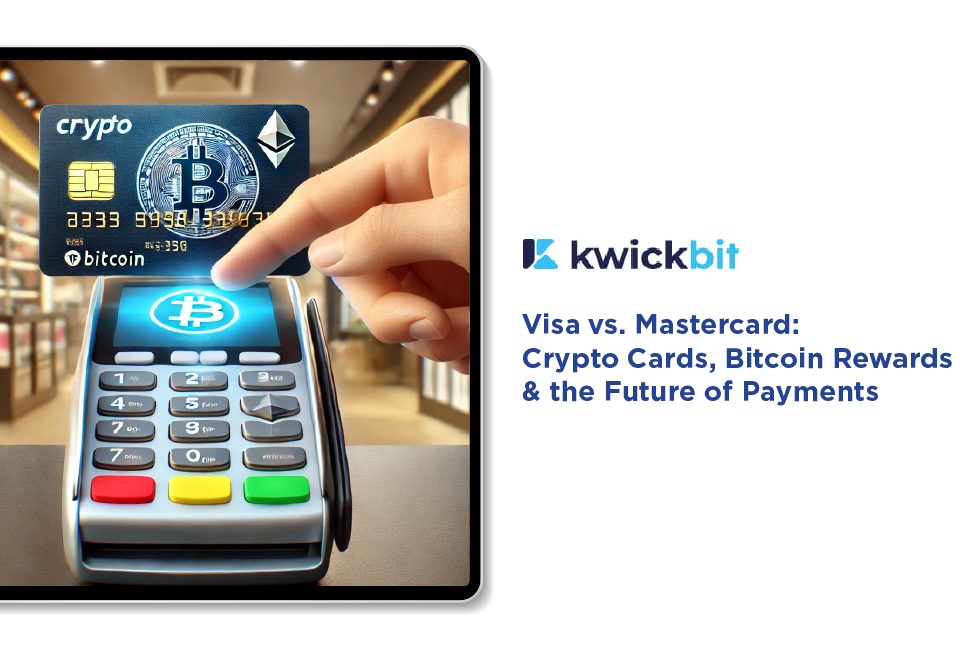Crypto cards are making waves in the finance world, and if you’ve ever wondered whether Visa or Mastercard is leading the charge, you’re not alone. These two payment giants are diving headfirst into crypto, offering everything from Bitcoin rewards to seamless spending with digital assets.
But which one is better? Uncover insights with KwickBit!
What Are Crypto Cards & Why Should You Care?
Crypto cards work just like regular debit or credit cards, except instead of spending traditional cash, you’re using crypto. The card converts your Bitcoin, Ethereum, or other digital assets into fiat currency in real-time, so you can use it anywhere Visa or Mastercard is accepted. Pretty cool, right?
There are two main types of crypto cards:
- Crypto Debit Cards – These are linked directly to your crypto wallet. When you make a purchase, your crypto gets converted and deducted instantly.
- Crypto Credit Cards – These work like traditional credit cards but reward you with Bitcoin or other crypto instead of points or cashback.
If you’ve got crypto sitting around, why not put it to use in everyday life?
Visa’s Crypto Game Plan

Visa saw the crypto wave coming early and jumped right in. They’ve partnered with some of the biggest crypto platforms to roll out crypto-friendly cards, making it easier than ever to spend digital assets. Some of their most popular offerings include:
- Coinbase Visa Card – Lets you spend crypto directly from your Coinbase account with no foreign transaction fees.
- Crypto.com Visa Card – Offers up to 5% cashback in CRO tokens, plus perks like free Netflix and Spotify subscriptions.
- Binance Visa Card – Supports multiple cryptocurrencies and gives cashback on purchases.
Visa has also teamed up with Fold, a Bitcoin rewards app, to offer BTC cashback on everyday purchases. Instead of earning boring old points, you get Bitcoin that could appreciate in value.
And let’s not forget Visa’s Fintech Fast Track Program, which helps crypto startups launch their own Visa-powered cards. This move has opened the door for even more innovation in the space.
Mastercard’s Move Into Crypto
While Visa took an early lead, Mastercard is catching up fast. They’ve partnered with key crypto companies to roll out their own crypto cards, including:
- Wirex Mastercard – A crypto debit card that lets you spend Bitcoin and other digital assets anywhere Mastercard is accepted.
- BitPay Mastercard – A prepaid crypto card that supports Bitcoin, Ethereum, and other cryptocurrencies.
Unlike Visa, Mastercard hasn’t fully jumped into Bitcoin rewards yet, but their partnership with Wirex allows users to earn up to 2% cashback in crypto. It’s a solid start, but Visa is still ahead in this department.
Mastercard has also expanded its crypto program to help fintech companies launch crypto-friendly payment solutions. It’s clear they see the potential in digital currencies, even if they’re playing catch-up.
Visa vs. Mastercard: Who’s Winning?
Let’s put them side by side and see how they compare.
| Feature | Visa | Mastercard |
|---|---|---|
| Crypto card availability | More widespread | Fewer options |
| Bitcoin rewards | Fold, Crypto.com | Wirex cashback |
| Crypto partnerships | Coinbase, Binance, Crypto.com | Wirex, BitPay |
| CBDC involvement | Working with central banks | More cautious approach |
Visa clearly has the first-mover advantage, with more crypto partnerships and better rewards. But Mastercard is making moves, and their recent push into crypto could shake things up in the coming years.
The Future of Crypto Payments

So where’s all this heading? Crypto payments are becoming more mainstream, and both Visa and Mastercard are helping bridge the gap between digital assets and everyday spending. Here’s what we can expect next:
- More Bitcoin rewards programs – Crypto cashback could become the norm.
- Wider merchant adoption – More businesses are starting to accept direct crypto payments.
- Government-backed digital currencies (CBDCs) – Visa and Mastercard are both in talks with central banks about integrating Central Bank Digital Currencies into their networks.
The bottom line? Crypto cards are here to stay, and they’re only going to get better.
Conclusion
So now you’ve reviewed about Visa vs. Mastercard: Crypto Cards, Bitcoin Rewards & the Future of Payments. KwickBit hopes this article will provide you with more useful information.
If you’re looking for a crypto card with the best rewards and widest acceptance, Visa is the clear winner. But if you prefer Mastercard’s ecosystem and want to earn crypto cashback with Wirex, that’s a solid option too.
Either way, both companies are making it easier than ever to spend crypto like cash, and that’s a huge win for the future of digital payments.
KwickBit – Non-custodial Payment Gateway
Read more:


